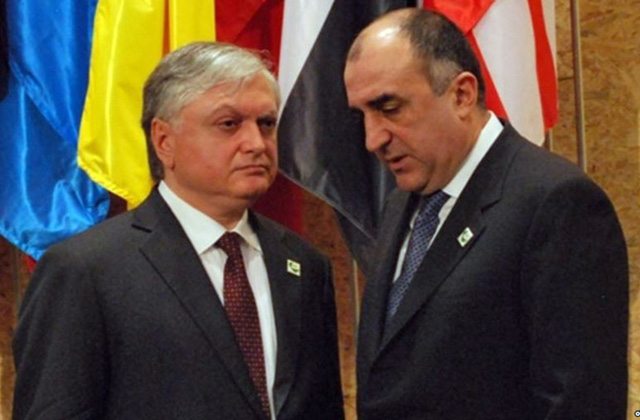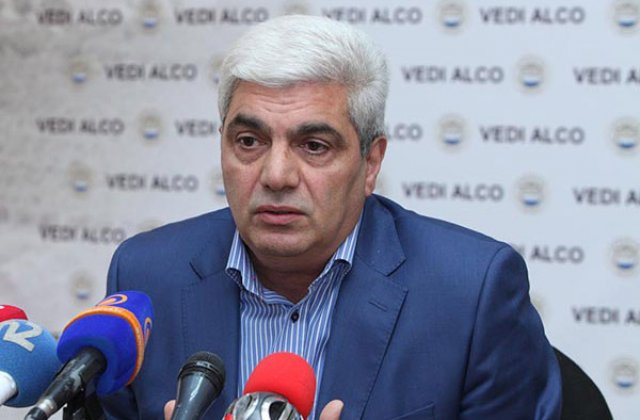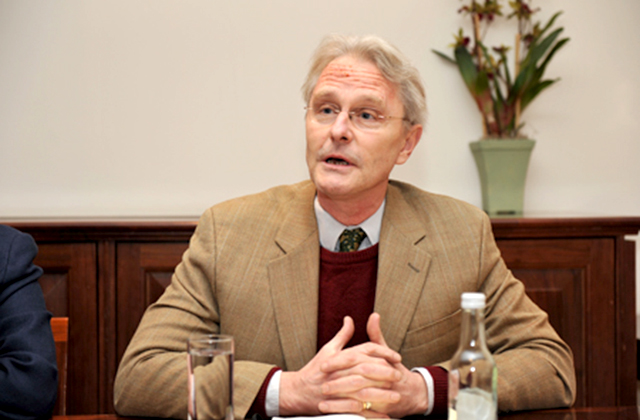Where will Nalbandian-Mammadyarov Munich negotiations lead to?

After a rather long pause, against the background of escalation on Karabakh-Azerbaijan contact line upon the initiative and presence of OSCE MG Co-Chairs the meeting of Foreign Ministers of Armenia and Azerbaijan Edward Nalbandian and Elmar Mammadyarov took place on February 16 within Munich Security Conference. The Co-Chairs issued a statement on meeting results, stating that the Co-Chairs discussed with the Ministers the current situation along the Line of Contact and the Armenia–Azerbaijan border.
The Co-Chairs reiterated that there is no alternative to a peaceful solution to the conflict and that war is not an option, and called upon the sides to exercise restraint on the terrain as well as in their public communications and to prepare their population for peace and not for war. The Co-Chairs also urged the Sides to adhere strictly to the 1994/95 ceasefire agreements that constitute the foundation of the cessation of hostilities. The Co-Chairs stressed to the Ministers the need to demonstrate greater flexibility and to resume comprehensive negotiations on reaching a lasting settlement as soon as possible. The Co-Chairs recognized that the Armenian authorities’ recent decision to return the body of an Azerbaijani serviceman was a helpful humanitarian gesture. It’s stated that the two Ministers reiterated their commitment to strictly observe their international humanitarian obligations.
The Co-Chairs also reflected to the upcoming Constitutional referendum to be held on February 20 in Nagorno Karabakh,
“The Co-Chairs are aware that a so-called constitutional referendum is scheduled to take place in Nagorno-Karabakh on February 20, 2017. Although the Co-Chairs note that the de-facto Nagorno-Karabakh authorities view the use of such a procedure as an effort to organize the public life of their population, they underscore again that no countries, including Armenia and Azerbaijan, recognize Nagorno-Karabakh as an independent and sovereign state. Accordingly, the Co-Chairs do not accept the results of the referendum on February 20 as affecting the legal status of Nagorno-Karabakh. The Co-Chairs also stress that the results in no way prejudge the final status of Nagorno-Karabakh or the outcome of the ongoing negotiations to bring a lasting and peaceful settlement to the Nagorno-Karabakh conflict.”
Stepan Grigoryan, head of the Centre for Globalization and Regional Cooperation, told “168 Hours” that there are three directions in the Co-Chairs’ statement. First, he reminded the statement issued on January 9, in which the parties called on the Armenian side return the body of Azerbaijani saboteur. Grigoryan stated he was concerned by this formulation of the Co-Chairs, as Armenia has never caused such humanitarian issues, moreover, wasn’t assessed like that. “I consider positive, that by this statement they positively stressed the step of the Armenian side on return of the body,” the expert said.

The second direction, according to him, refers to upcoming Constitutional referendum in Karabakh.
It was also formerly stated that elections, referendums in Karabakh don’t predetermine Karabakh’s status, I don’t see anything new here. It was new, that they stated that Armenia doesn’t recognize Karabakh’s independence, which they couldn’t mentioned as well. It’s stressed about Constitutional referendum results as Karabakh is implementing its unilateral step, doesn’t agree it neither with Azerbaijan, nor with any other side, and as negotiations continue, and there are Madrid principles, providing steps toward the status, and not unilaterally. They state that this referendum, which you organize, has no connection to the settlement variant,” Grigoryan said.
The third observation according to Grigoryan is that the Co-Chairs rather quickly reflected to the fact that referendum should be held in Karabakh. “However, Azerbaijanis plan to implement repair works in places closer to the contact line, and they introduce it as liberation of villages. It’s directly linked to NK conflict, and is directly on the contact line. I wondered that circumstance was missed from the document,” S.Grigoryan said.
He doesn’t consider that the meeting will change anything on the conflict zones and in peaceful settlement negotiations, which is connected to the circumstance that Azerbaijan pursues other purposes by participating in both presidential and ministerial meetings.
“Azerbaijan’s position has sharply changed in the period of recent 3-4 years. Currently they meet for submitting ultimatums. They don’t meet to discuss how to resume negotiations, how to find settlement on existent situation, they meet to say that they’ll proceed with this policy, will exert pressure over the Armenian side in all fields—diplomatic, military, political, until they return territories. This is the reason that I don’t have positive expectancies from such meetings. Moreover, it’s mentioned in the statement that agreements reached in Vienna and St. Petersburg aren’t being implemented, the call on the states to start their implementation, however, there is no sense addressing such calls to the Armenian side, as it agrees on them. I don’t see preconditions that Azerbaijan’s policy will hereinafter mitigate,” Grigoryan said.
According to the expert there is no coldness on Moscow-Baku platform at all, as some analysts claim, judging from recent statements by Lavrov, Mammadyarov and Aliyev. According to him there is pragmatic solution. “Azerbaijanis expressed their complaints on Russia through various statements, and Russian Foreign Ministry in the context of NK referendum stated that it doesn’t recognize NK independence, meanwhile, they could only state that they don’t recognize results of that referendum. Azerbaijan wasn’t satisfied with some comments, they sent a message that they dislike it, by the last statement Russia sent a positive message to Azerbaijan,” Stepan Grigoryan said.
Neil Macfarlane, professor of International Relations at Oxford University, specialist on Russia and the South Caucasus, PhD in political science, told “168 Hours” that the statement by the Co-Chairs doesn’t contain any new hue. He doesn’t anticipate serious results under these conditions, as long as the sides aren’t ready for concessions and military rhetoric dominates.

He stated that NK conflict final settlement is being postponed due to the very reason, that there isn’t intention to go to concessions, societies also perceive this rather sharply.
“The conflict isn’t being settled not for the reason that there are no meetings, no negotiations, no clear options to satisfy the sides, or diplomats of the Co-Chair countries don’t work well, but neither the authorities, nor the societies of the parties to the conflict aren’t ready for concessions.
By the way, they are concessions, which won’t mean a victory or a defeat to any side. Parallel to this, the international community fails to exert such a pressure over the sides, that they took the direction of settlement and concessions. As long as these smallest preconditions lack, such meetings around conflict settlement will lead to zero direction,” Neil Macfarlane said.
By Araks Martirosyan

























